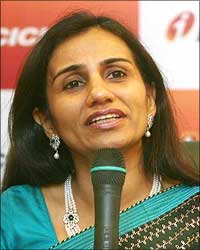 | « Back to article | Print this article |
 The second half of the financial year will be an important milestone for ICICI Bank. After two years of painful contraction, growth has started taking place.
The second half of the financial year will be an important milestone for ICICI Bank. After two years of painful contraction, growth has started taking place. After six-seven quarters of shrinking the retail loan book, the third quarter is likely to see what MD & CEO Chanda Kochhar calls "meaningful growth". Credit card and personal loan portfolios would no longer be reduced. However, as they have reached an optimum level, they would not be expanded either.
Now, the bank's mantra was "profitable and sustainable" growth, Kochhar said.
After a gap of two years, the bank would see the size of its balance sheet increase this financial year - albeit by a modest 15-18 per cent. Next year, the run rate would be 25 per cent, the CEO of the country's largest private sector bank said in an exclusive interview to Business Standard.
"In terms of consolidation, I think we have more than achieved what we set out to. That has made our balance sheet even stronger to get on to the growth track. From here, we are clearly looking at growth," she said.(Click for table: http://www.business-standard.com/content/general_pdf/010711_01.pdf)
Till the end of the second quarter, year-on-year loan growth was missing, though there was an upswing incrementally, that is, the bank was sanctioning more loans as compared to the previous quarter. However, sanctions for fresh retail loans were lower than re-payments. In the third quarter, the situation reached a breakeven point, that is, new business equalled re-payments.
With corporate portfolio already growing, overall, the bank would achieve loan growth in the current quarter and in 2010-11, after two years. Thus, growth is definitely back on track. However, in this version, the path is markedly different from the K V Kamath-led model.
In Kochhar's scheme of things, unsecured loans are a 'no-go area'. Moreover, the bank does not want to enter sectors forbidden during the consolidation phase - two-wheelers and consumer durables, for example.
"The consumer goods financing market has become a personal loan market. At the back of it, you have the security of a TV, but is it viable to go and take possession of a television?," asks Kochhar.
A similar logic applies to two-wheelers, where it is difficult to exercise security. The bank's retail growth will be driven by home, four-wheeler and commercial vehicle loans. But again, without the aggression of the past.
When asked if the bank would get aggressive in the home loan market, the way the largest lender State Bank of India was pushing home loans with its so-called 'teaser' schemes, Kochhar said, "The home loan market is growing at a reasonable rate. I think players will do well following the growth of the market. There is enough growth for everyone. If we just follow the demand, we all will have decent growth at a sustainable profit. That is important."
In 2010-11, the home loan portfolio is expected to grow by 15 per cent. ICICI has over 2,500 branches and plans to set up another 300-400 next financial year. Kochhar said the bank was on its way to achieving a return on equity of 15 per cent in the next financial year, as against an expected 10 per cent this year.
She made it clear that despite returning to the growth path, the decisions taken during the consolidation phase would not be reversed. That would mean focusing on a healthy share of low-cost deposits, or current and savings account deposits, which are 40 per cent of the total, besides controlling costs and non-performing assets.
Kochhar said she was bullish on India's growth as two things were going well for the economy. Demographic dividend was one, the other being the investments the country needed for manufacturing and infrastructure. "We do have certain kinds of challenges to manage, such as inflation and interest rates going up, liquidity and volatile capital flows. But, I think these are manageable," she said.